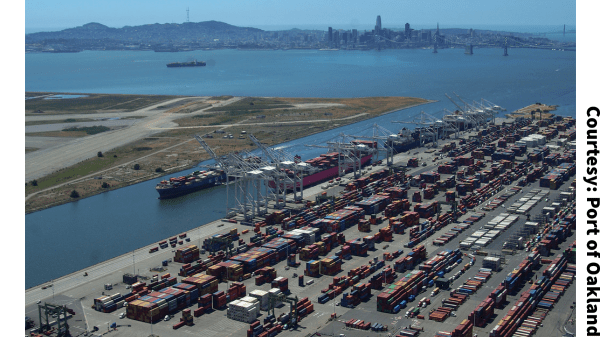I’m left a bit dazed by all the news about port closures, delays, and disruptions over the past couple of years. For the most part, they have faded into a vague blur in my mind.
Yet one port manages to stand head and shoulders above the herd of shipping disasters: the Port of Oakland.
How bad is the Port of Oakland?
The Almond Express should tell us something.

It’s a project launched by the Blue Diamond Almond Growers cooperative in July to get its members’ product to market.
That means bypassing the Port of Oakland.
The Almond Express involves two different rail supply lines. One is in Fowler, in the south of California’s San Joaquin Valley, where a large amount of the crop is produced. It goes directly from here to the ports of Los Angeles and Long Beach.
The other one involves taking the crop to the railhead of the Port of Oakland to be shipped south to the ports in Southern California.
That’s right. Almond growers are taking their crop to the railhead of the Port of Oakland, but it’s better for them to ship it over 400 miles south by rail than to deal with the Port of Oakland.
If the shipping industry has a Bizarro Award for ports, Oakland is a strong contender.
The port got headline attention when it was disrupted by a recent action by independent truckers to protest California’s AB 5. The port was closed for five days.
Don Barton, whose family operation in the northern San Joaquin Valley grows some 2,000 acres of walnuts, points out that although the Port of Los Angeles suffered similar action, it “stayed open.”
Barton also notes that for each day a port is shut down, it takes about a week to recover.
“We first became aware of issues 18 months ago,” Barton explains. At first, delays were “not serious, infrequent,” but “problems became acute about a year ago, in the summer of 2021, and leading into this crop year,” which for walnuts runs from September 1 to August 31.
By way of comparison, Barton notes that on June 1 of 2020, his company had 22 loads of walnuts left in storage. In 2021, there were 19 loads. On June 1, 2022, there were 88 loads still to ship.
The explanation, Barton believes, is simply “the quality of management, a lack of engagement.” He says the executive director of the Port of Oakland, Danny Wan, was a political appointment made by the mayor of Oakland. Wan has been serving in this position since 2019.
Wan, an attorney, was not appointed for his expertise in shipping management. Barton believes that the main objective in naming him to the post had to do with professional sports. Barton points out that Oakland has already lost the Oakland Raiders and the Golden State Warriors and has determined that it simply cannot afford to lose the Oakland A’s.
Consequently, Oakland is following the example of San Francisco across the bay, which faced similar threats of losing the Giants until it built the team a new stadium, which opened in 2000 in the city’s China Basin district. (The city has meretriciously sold the name to various companies, so that at various times it has been named Pacific Bell Park, SBC Park, and AT&T Park, and today is Oracle Park).
Wan contends that “shipping is not the best use for Howard Terminal,” the putative site for the new stadium, “where cargo vessels have not docked since 2013.”
The city of Oakland has resolved to have the port relinquish 56 acres of land to build a stadium for the A’s.
Mindful of San Francisco, where the China Basin Stadium was turned down by the voters a number of times, the council has removed a referendum measure on the stadium from November’s ballot.
Wan was appointed to make sure that this transfer occurred. “The director delivered on what his charge was,” says Barton. “That tells you what the Port of Oakland sees as its number one mission.”
Of course, the two issues are distinct. The new stadium may well be the best use for the property. But it may well also be true that day-to-day management of the port has been gravely neglected in the process.
As the Almond Express indicates, agricultural interests in California are giving up hope on the Port of Oakland and are looking to develop alternatives.



